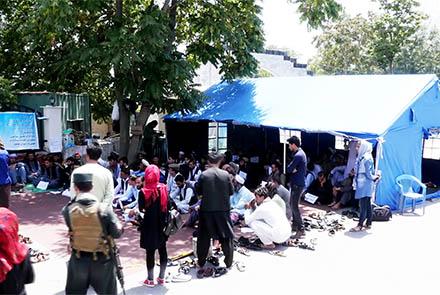A 26-year-old People’s Peace Movement member from Zabul lost his wife last week after she died from appendicitis.
Anamulhaq Khetab, who joined the original peace convoy in Zabul two months ago, said his wife died in their remote village as there had been no one at home to take her to hospital.
Khetab, who is from Sori district in Zabul, has three children and said one was still “a very small baby”.
“I returned (this week) after attending my wife’s funeral ceremony and rejoined the peace movement,” he said.
According to him his elderly parents are now taking care of his children. He said his eldest child, a boy, is three years old, his second son is two years old and his daughter only 10 months old.
"My father and mother said they would take care of the children and they support me about this move," he said.
Khetab said he had been in Kabul with the peace movement when he received news that his wife was very ill.
“I was with the members of the peace convoy and I received news that my wife was very sick; that she had pain for nearly two days.”
Khetab meanwhile said when he first joined the peace protest he kept the news to himself and did not tell his father. Now however he has his father’s support, he said.
Khetab and his fellow peace movement members are currently holding a sit-in protest outside the Pakistani embassy in Kabul.
“I went there to attend her funeral ceremony and then returned to rejoin the convoy; I will accompany this movement till the end,” said a member of the peace movement, Enaam-ul-Haq.
“We call on Pakistan to shut down terrorist training camps and stop meddling in Afghanistan’s internal affairs,” said the peace movement’s leader Iqbal Khyber.
The members of the peace convoy said that they will continue their protest outside the Pakistani embassy “until there is a clear situation” and only then will they move on to the Iranian embassy.
Movement Started In Helmand
The peace activists, known initially as the Helmand Peace Convoy, launched their protest in Lashkargah City after a suicide bombing outside a stadium in March. About a month later, a group of eight protestors left Helmand on foot for Kabul.
The activists walked through towns and villages, crossed provinces and met with local residents along the way. For 38 days they walked and as they progressed, so their numbers grew.
About 700kms later, the group of eight had grown to an estimated 100. They arrived in Kabul on June 18 and handed over demands for a ceasefire and peace to both the Afghan government and the Taliban.
The peace convoy first launched their sit in protest outside UNAMA’s offices in Kabul and then moved on to the US embassy – where they stayed for nine days.
The activists sent a letter to the American people, asking them to put pressure on the US government to end the war in Afghanistan.
From there they moved to the Russian embassy, where they spent five days.
They are now outside the Pakistani embassy.
The activists, whose ages range from 17 to 65, come from all walks of life and include students, athletes and farmers among others.


